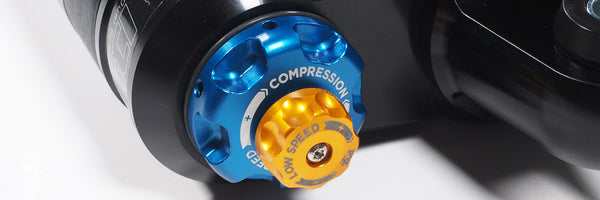
Low-Speed Vs. High-Speed Compression
One of the significant benefits of Fox's Factory Race Series shocks is their DSC (Dual-Speed Compression) adjusters. But what exactly does a DSC adjuster do? What is the difference between low-speed and high-speed compression? Heck, what is compression even? If you are asking those questions, don't worry. You are not the first one to ask them, and we are here to help. Let's break it all down so you can decide if DSC adjusters are for you.
First, you need to know what compression is. As its name suggests, compression is the damping force applied to shock as it compresses. Anytime you hit a bump, your shocks compress, and compression damping comes into play. Rebound is the exact opposite of compression. After the shocks compress, they "rebound" or extend back into position. Both compression and rebound damping play a considerable role in suspension performance. A vehicle without shocks that have proper compression and rebound damping is a nightmare to drive off-road.
High-speed and low-speed compression takes compression and splits it into two zones. The "high" and "low" do not deal with vehicle speed, but rather shock shaft speed. You can be traveling at 80 mph down a smooth dirt road, and your shock shaft speed will be relatively low because your shocks aren't moving that much. Travel down a road at a much slower 30 mph and hit a big square edge bump or pothole, and shock shaft speed is relatively high.
The ability to fine-tune each of these compression zones is a significant advantage. Compression valving is always a bit of a compromise in a standard shock. Lots of compression damping will allow a shock to handle big impacts with higher shock shafts speeds. But all of that compression damping will produce a very rough ride on smaller, low shaft speed hits. The opposite is also true with a lack of compression making for a smooth ride on smaller hits, but easily bottoming out on bigger ones. Most shock manufacturers try to find a happy middle ground of compression damping that works okay in a variety of situations. But by allowing for adjustment of both high- and low-speed compression, you can dial in compression perfectly for your situation and needs. There no longer has to be a compromise in valving.
In the rear world, this adjustability translates to the ability to dial in better ride comfort and more control in a wider variety of terrain. Dial out low-speed compression and up the high-speed compression, and you will have a suspension that can eat up small bumps and chatter while still smoothly handling bigger hits. No conventional shock can offer that level of adjustability, versatility, and performance.
Fox's DSC adjusters also offer a lot of adjustment. The low-speed adjusters have nine clicks of adjustment and can add up to 150% more low-speed compression. Fox's DSC high-speed adjusters have 11 clicks and add 30-60% more high-speed compression depending upon the application. This level of adjustability means that you can find a combination that works whether you like to poke around off-road or go fast. And, if you add weight to your vehicle in the form of armor or cargo in the future, you can still dial in the ride.
So are Fox's DSC adjusters worth it? If you are looking for the ultimate in adjustability, versatility, and performance from your suspension, we would say that they absolutely are. Once you get them dialed to your liking, they will make a significant difference in the comfort and capability of your suspension and vehicle.
